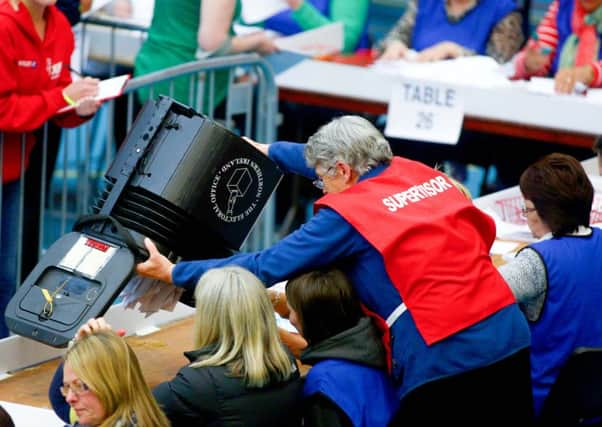'˜The choice within unionism is narrow but it's choice at least'


Like the first cuckoos of spring and with elections imminent, demands for every other unionist to stand aside are repeated endlessly.
When it comes to the DUP, democratic choice, the essence of a PR election, is disposable as an appeal to sectarian fear and a tribal head count emerges solely designed to appeal to the lowest common denominator and calculated to deliver another period in power.
Advertisement
Hide AdAdvertisement
Hide AdDefined by polarity, it is beginning to sound like the slow lament of tired politics. Is this the ‘Fresh Start ’? Continuing to exploit ancient quarrels and sustain division will not deliver transformation.
Many within the unionist electorate have moved on and want to redefine their politics in terms of positive social engagement and consensual policies that focus on economy, unemployment, health and education.
These are the priority and successful solutions to many of the underlying problems related to these areas would help to solve issues arising from latent sectarianism and segregation. Cookie-cutter unionism, based on old populist recipes, no longer offers appeal to a large swathe of the unionist electorate particularly, but not only, younger voters. They want issue-centred and solutions-based politics informed by social justice, equality and ethical principles not those defined by labels of left or right, Protestant or Catholic, Unionist or Nationalist but rather by the potential for delivering investment and employment beyond the Belfast ‘ bubble’, stability, prosperity and opportunity for all.
This is the only valid 21st century unionism that the electorate should be asked to endorse not the narrow unionism offered by those who view its appeal as narrow and single identity.
Advertisement
Hide AdAdvertisement
Hide AdDo the DUP not realise that when you choose your voters and give up on some of the electorate, you effectively give up on yourself? It is a lazy sense of unionism that treats one chosen constituency as worthy of respect and allows prejudice to shape the campaign. If you opt merely to appeal to your ‘ tribe’, identify only with narrow cultural symbols and emblems and treat as unwanted other cultural and social groups then this is a target you will surely hit. Contrary to what they believe it will drive many of the electorate from the polls.
Whether or not the DUP is unnerved by its recent internal squabble and the emergence of its former standard bearer as an electoral rival this is not an excuse for wanting to deny choice. In any case, an individual whose temporary on-off courtship with another unionist party has served to undermine rather than build confidence and whose only claim to well-balanced unionism is grievance politics manifesting as having a political chip on both shoulders cannot surely be a serious rival.
With regard to the UUP as an alternative it will need to move beyond the emergence of glossy policy documents and establish its credentials.
The UUP spent its last mandate as a DUP-light party sometimes wholly in the Executive and on other occasions in opposition within the Executive before eventually withdrawing to go into opposition as the election approached. It moved from unionist pacts to no pacts and then returned to pacts. On some social issues it sits on the fence. This is hardly leadership for the whole community and smacks of expediency and opportunism. Having to constantly claim that you want to make things work seems a strong indication that you have not been doing this even where you have shared Executive power. The record is not encouraging and shallow slogans do not make for policy.
Advertisement
Hide AdAdvertisement
Hide AdAlso, in several constituencies and for a time it seemed in Foyle, it has found it easy to endorse as candidates aggrieved members of the DUP. This suggests the parties are not far apart so some of those who vote will probably transfer and the fears of the DUP should prove unfounded. If this is not case the parties will have failed, not the electorate.
In the last Assembly elections, for reasons that are a matter of history, the UUP did not run a candidate and UUP voters felt disenfranchised. The DUP had a free run and the electorate were denied a choice. What has been achieved for Foyle?
The choice within unionism on offer this time is narrow and unlikely to have appeal across all sections of the community. The electorate may prove me wrong but at least choice will determine this. The DUP should have the grace and decency to recognise this as beneficial.